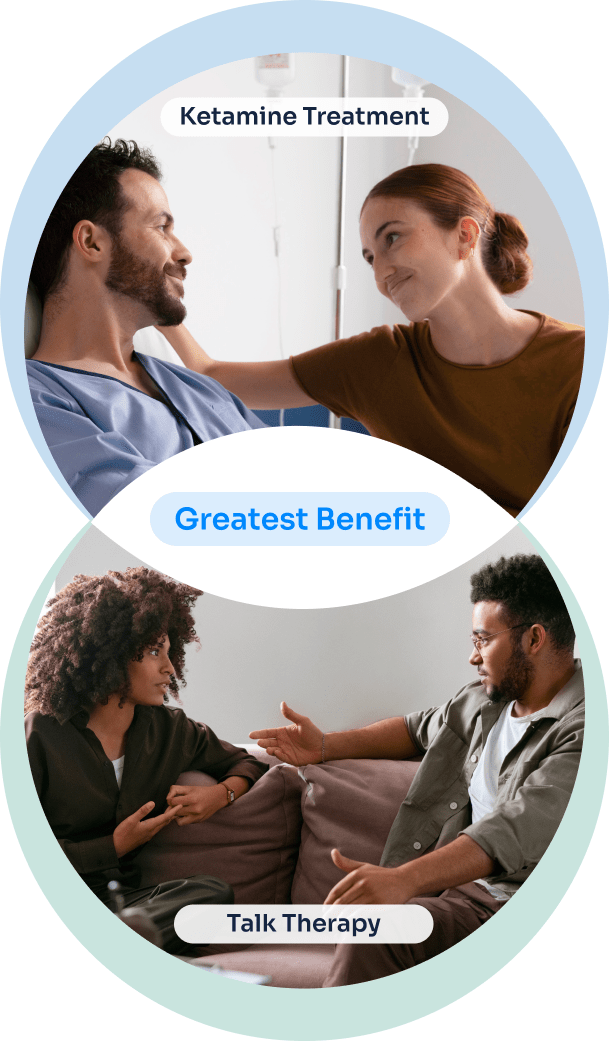Ketamine & Therapy
Ketamine and talk therapy work synergistically to provide you with maximal and long lasting improvements in mood and shifts in perspective
How Ketamine and Therapy Work
Ketamine activates a novel receptor in the brain that traditional antidepressant and anti-anxiety medications have ignored. While most antidepressants modulate the serotonin system, Ketamine works by acting strongly on the NMDA receptor system. Ketamine’s effects are felt rapidly by individuals who have not found relief with traditional treatments.
Ketamine can help “rewire” circuits in the brain by promoting the growth and connection of new neurons that control memory and emotion. Unlike traditional antidepressants which take months to become effective and require regular daily intake, Ketamine acts rapidly and often retains its positive effects for months after infusions are completed.
Although talk therapy (also known as psychotherapy) is not required to feel the therapeutic power of a Ketamine infusion, many of our patient’s find that Ketamine fosters a more receptive state for talk therapy and provides an extended window for transformative healing.


Therapy
We encourage all of our patients to be connected with therapy during their care with us. If you do not currently have access to a therapist, let us know so we can happily link you to a compassionate therapist in your community. We believe that Ketamine treatment works best in conjunction with ongoing treatment with your therapist and psychiatrist.
Once you begin your infusions with us, a Helios Health integration specialist will track your progress and collaborate with you to create a personalized long-term plan for your mental health transformation.
If you are a mental health practitioner interested in offering holistic mental health services, click the button below! We would love to hear from you and connect with you.
Success Stories







FAQs
Frequently Asked Questions and Answers about Ketamine

Ketamine is an anesthetic medication that has gained attention in the context of mental health for its potential to rapidly alleviate symptoms of depression and other mood disorders when administered in controlled, clinical settings.
Ketamine can be an exceptionally effective option to relieve symptoms of depression. It can help people even when other treatments, such as traditional antidepressants have not worked. Our physicians will work with you to determine a treatment plan that is tailored specifically to your symptoms and your clinical response to treatment. Studies have shown that ketamine relieves depressive symptoms in up to 85% of patients with depression, and can start having a significant effect even after the first infusion (CANMAT).
Although traditional antidepressants have been prescribed for years, many patients require trying multiple different ones to find one that alleviates their symptoms. For example, after starting an antidepressant, which takes one month to fully take effect, one can expect a one-third chance that the antidepressant will improve symptoms significantly. Additionally, about one-third of patients will have an intolerable side effect from SSRI’s (STARD*D).
Yes, when administered in controlled medical settings and under the supervision of healthcare professionals, ketamine is generally considered safe. Ketamine has been safely used in hospitals and clinics daily for decades to millions of patients. However, like any medication, ketamine can have side effects and risks, especially when used improperly or in high doses, which is why its use should be carefully monitored by qualified healthcare providers.
The most common side effects from Ketamine are nausea, headache, and blurry vision which are temporary. Additionally, Ketamine may increase heart rate and blood pressure, if this is the case, the physician monitoring you will intervene. There are no known long term side effects from Ketamine.
There is a strong body of literature supporting the use of Ketamine in depression. Since 1971 there have been over 1400 peer reviewed papers published looking at the use of ketamine for depression. The American psychiatric association (APA) as well as Canadian Network for Mood and Anxiety Treatments (CANMAT) have both published consensus guidelines for how to use Ketamine in patients with depression which we adhere to.
Nevertheless, there have been instances of ketamine misuse by individuals seeking altered mental states, particularly in non-medical settings, without the oversight of trained medical professionals.
Our standard charge for each treatment visit is $600. There are no additional fees for intake, care coordination, or any other services beyond the office visit charges. Payment is expected at the time of each in-office visit, typically using the credit card you provided during the intake process. You are welcome to use an HSA, or healthcare spending account. If you are seeking concierge service, where a member of our healthcare team comes directly to your home or office to offer ketamine infusion, an additional charge will be assessed.
Individuals with out-of-network insurance coverage can anticipate reimbursement for their treatment at our facility. Presently, our services are not included in the network of any insurance plans.
A typical infusion lasts 40 minutes followed by a period of resting time. Expect to spend 1-2 hours with us depending on if its your first time with us or you have visited before.
Each patient experience will vary. Based on both existing literature and our own clinical experience, some individuals may achieve substantial symptom relief following just one infusion, while for others, it might require up to three or six infusions. Many patients experience full remission of their depressive symptoms after these infusions. Others may benefit from continuing infusions as symptoms arise. Our recommendations will be personalized, taking into account your medical history and your response to treatment.
Ketamine may not provide as robust relief from depressive symptoms for patients who are concurrently taking Benzodiazepines (such as Valium, Klonopin, Xanax, or Ativan), or for patients who are frequent users of marijuana or cannabis.Prior to initiating treatment, we undertake a comprehensive assessment, which includes a review of the patient’s medication history, along with a thorough medical history and physical examination. We proceed with the infusion therapy only if the patient’s current physical condition and medication history do not present any contraindications to the treatment.
There are no specific medical conditions that absolutely prohibit the use of ketamine treatment. However, it is important to note that ketamine is typically not recommended for individuals with schizophrenia or those with uncontrolled heart or blood pressure problems.
Reference Links
Ketamine has a growing body of literature supporting treatment for depression, anxiety, pain, and other related conditions. Check out some of our favorite studies from these prestigious medical journals.
Synthesizing the Evidence for Ketamine and Esketamine in Treatment-Resistant Depression, American Journal of Psychiatry 2021
The Role of Ketamine in the Treatment of Bipolar Depression, Brain Science 2023
Neurocognitive effects of subanesthetic serial ketamine infusions in treatment resistant depression, Journal of Affective Disorder 2023
A Consensus Statement on the Use of Ketamine in the Treatment of Mood Disorders, JAMA Psychiatry 2017
Intravenous Ketamine for Late-Life Treatment-Resistant Depression, American Journal of Geriatric Psychiatry 2023
Ketamine versus ECT for Nonpsychotic Treatment-Resistant Major Depression. New England Journal Of Medicine 2023
For any questions please reach out to us
at info@helioshealth.net we typically respond within one business day.
